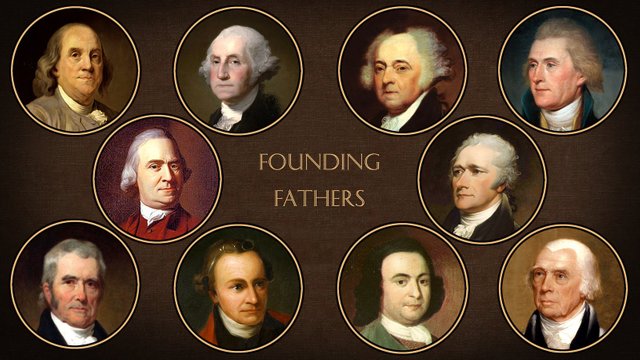What is a Classic Liberal?

Americans who still believe in the Constitution and the protections it offers are more in line with Classic Liberals than modern conservatives. Unfortunately, the word 'liberal' has been highjacked by leftists, Marxists, Socialists and Communists. It has not always been that way. Many of our founding fathers considered themselves to be Classic Liberals and the Constitution reflects many of those values.
Classic Liberalism advocates private property, an unhampered economy between consenting citizens, the rule of law, the right to keep and bear arms, constitutional guarantees of freedom of religion and of the press, and other principles that are found in the Bill of Rights. Although there were many differences between individuals and groups of founding fathers, these principles of classic liberalism are what bound them together to produce not only the Constitution but the very essence of the nation.
The father of Classic Liberalism is John Locke, who believed that
- work creates private property and value
- people have inalienable rights to life, liberty and property
- all people are born equal and free
- government powers should be separate.
Another famous Classic Liberal was Adam Smith who is also the father of classical liberal economics. He penned the famous treatise, The Wealth of Nations in 1776. Smith gave us the principles of competition, supply and demand and self-interest in making economic decisions.
However, there were other labels that also defined some of the Founding Fathers. Some were Democrats, who favored some elements of democracy. Some were Federalists who favored a confederation or federation of states. Some were Republicans who favored a republic form of government.
In general, however, all of them could be considered Patriots because they loved freedom and liberty and hated the rule of monarchs in England. No matter how heated the arguments became, and they were all known for spirited debate, they still retained the core values of Classic Liberals.
In 1776, there was also a group of citizens called Conservatives, but they were considered Loyalists to the Crown. They favored a power structures where the few ruled the many, and sought to mold America to be compatible with the Crown while not severing all ties with it. In other words, they stressed changing the existing system to be more sympathetic with their goals, rather than replacing it with a brand new system.
We can be thankful that those Conservatives did not win the day over the Classic Liberals in 1776, or we might not be here today. However, in today's political arena, we see exactly the same struggle playing out. Just about every citizen today complains about how little difference there is between the Democrat and Republican parties, and how a two party system always seems to just give us more of the same. This is true because both parties are basically cut from the same cloth: the Democrats (progressives) want radical change and big government; the Republicans (conservatives) say "Whoa, not so fast" and propose goals that lead to the same conclusion, perhaps more slowly but they lead to the same end.
For those who revere the U.S. Constitution and the Bill of Rights, perhaps reclaiming the title 'Classic Liberal' is a good thing.
In any case, Citizens for Free Speech is driven by the First Amendment that was taken straight out of the Classic Liberal philosophical playbook, and we are proud of it. These values are worth fighting for.
Benjamin Franklin wrote, "Freedom of speech is a principal pillar of a free government. When this support is taken away, the constitution of a free society is dissolved." He also said, "Our liberty depends on the freedom of the press, and that cannot be limited without being lost."
If you believe Franklin knew what he was talking about, then the stakes in today's America are very high as it grapples with rank censorship, oppression of an open press, political correctness and bullying in the public square. This rancor serves no one except Democrats and Republicans and leaves the backbone of America - its citizens - to set record straight again.
We dare not squander the opportunity.
Curated for #informationwar (by @openparadigm)

Relevance: Classical Liberal or Liberalist
Our Purpose
https://discord.gg/D3H7kd
This is our Discord Channel.
The term 'liberal' has changed in meaning profusely over the generations. Yes the real and raw organic meaning of liberal is a wonderful thing standing for freedom and rights and all that is good. Today it has been hijacked by an evil force out there and has taken a role that is opposite and even orwellian. I pray for America that we can restore it to its original luster. Thanks @richq11
Excellent!! Although I am not North American, I consider myself classical liberal in the same sense as the founding fathers of the United States. On the other hand, about the last thing that Benjamin Franklin said, he reminds me of Kennedy's speech addressed to the press, in which he lost a kind of self-censorship, since Kennedy did not seek to restrict freedom of the press at all, but he he asked the journalists to be smart and patriotic when it came to making their publications, because although the cold war was not a conventional war, it was still a war, I think it was a good gesture of Kennedy not to try to use the power of the State to censure, now it seems that they try to do the opposite.
I generally consider myself somewhere between a classical liberal and a libertarian. I would say that they are actually very close except that many people using the "libertarian" label today are really anarchists.
Correct. True Libertarians are anarchists, but many people who call themselves libertarian don't really understand the whole doctrine. (https://www.libertarianism.org/columns/anarchism-libertarianism-two-sides-same-coin) Generally speaking, however, anyone who seeks limited government, commerce between consenting businesses, the rule of law (vs. the law of rules), is headed in the right direction.
I think a "libertarian" philosophy as supporting minimal government as opposed to no government like anarchists. I tend to think of anarchy an unobtainable utopian ideal like any other "pure" philosophy. However, I'm happy to support reducing government until and unless it becomes obvious things are getting worse. I think the problem with many anarchists and libertarians is that they aren't willing to compromise by participating within the system to help reduce it. I'm not talking about compromising ideals, just being willing to aim for and accept small victories wherever possible and then moving on to the next goal. Right now, abolishing a single government department would be a huge accomplishment but achievable if all limited government types would work together more. And once one falls, further reductions in government and regulations on voluntary interactions become easier. Sure, we could have a revolution but I don't think that is ideal. Not practical at this time and frought with risk at any time.
We already had a revolution (1775-1783) that was a complete break from previous rulership. The result of that gave us the Constitution, a Constitutional Republic and a very sensible set of checks and balances to keep things on track. All significant discussions, arguments and debates were held back then. Thus, we don't need another revolution, only a return to where we started in the first place. The globalists are doing everything in their power to keep us from our roots because they know it could destroy them.